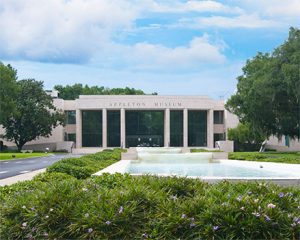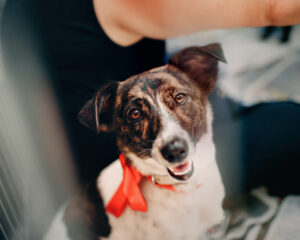

Everyone, and we mean everyone felt the pinch of initial lockdown back in the early days of Covid. There were a lot of things that changed instantly about the way we work and live, and it had almost everyone worldwide scrambling to figure out how to earn livings, pay bills, and keep businesses afloat in a situation where our normal ways of doing those things were abruptly kiboshed.
 “I was kind of sitting on the idea for a while,” Abramson says. He had worked on similar series at other stations and thought it could work at WUFT with some modifications, but the opportunity hadn’t presented itself yet. Then, he says, “Covid happened.”
“I was kind of sitting on the idea for a while,” Abramson says. He had worked on similar series at other stations and thought it could work at WUFT with some modifications, but the opportunity hadn’t presented itself yet. Then, he says, “Covid happened.”
“We realized we couldn’t go to events, couldn’t fundraise – just like everyone else. We all felt captive and less in control in the early days of Covid.” He explains.
As part of the University system, he and his coworkers had an extra bulwark of support and resources other people didn’t have. “We had a conversation about how not everyone is as fortunate as we are.”
“We work with a lot of non-profit organizations, who usually depend on events for fundraising,” she points out. “But they were shut down and couldn’t do things like that during the pandemic. This was a way for them to get on the air, get some donations and support. And it’s a way we can give back to our community, too.”
From there, she and Matt began fine-tuning and laying out a game plan for the concept. “We worked on the format, the budgeting and fees. We give the non-profits a copy of the episode so they can use it however they like, and we rebroadcast the episode multiple times throughout the year. We went into it thinking, ‘gosh we hope we can have at least three shows’.” She laughs. “But we had such an incredible response to this.”
“We work with a lot of non-profit organizations, who usually depend on events for fundraising. But they were shut down and couldn’t do things like that during the pandemic. This was a way for them to get on the air, get some donations and support. And it’s a way we can give back to our community, too.”
—Sandi Wagner
Director of Corporate Support for Education Outreach
 Nearly two years after she and Abramsom brainstormed the creative concept, Greater Good has profiled over 80 organizations, including the Appleton Museum, Marion County Children’s Alliance, Haven House, and Artwalk Gainesville. When a new episode is ready, it airs on Fridays at 8:30, and the station re-airs previous episodes during the rest of the week.
Nearly two years after she and Abramsom brainstormed the creative concept, Greater Good has profiled over 80 organizations, including the Appleton Museum, Marion County Children’s Alliance, Haven House, and Artwalk Gainesville. When a new episode is ready, it airs on Fridays at 8:30, and the station re-airs previous episodes during the rest of the week.
Because WUFT is still on cable services in Jacksonville and other towns as the local PBS station, it has a 19-county coverage area that includes both Alachua and Marion counties. That’s a huge audience of potentially over a million people – so the organizations profiled were able to reach a wide swath of the public during a time when the pandemic was crippling their ability to promote and engage their missions. Abramson stresses the importance of not making things overly complicated or calculated when filming the episodes.
“When we started doing this, it was a new way of storytelling for me. Now we’re really comfortable with it, and it was nice getting into that routine. For me, the best part is going to meet these people, getting to know them and to be able to help them.”
—Matthew Abramson
Director of Media Services
He also really enjoyed getting the opportunity to flex his creative muscles. “When we started doing this, it was a new way of storytelling for me. Now we’re really comfortable with it, and it was nice getting into that routine.” he says. “For me, the best part is going to meet these people, getting to know them and to be able to help them.”
 It opened up a much-needed avenue for the organizations to be able to continue outreach and promotion, which is the lifeblood of nonprofits: Fundraising and engagement are vital to community relations, support, and donations. Telling people who they are and what they’re about is crucial to their survival. The show gave them a real sense of empowerment and opportunity.
It opened up a much-needed avenue for the organizations to be able to continue outreach and promotion, which is the lifeblood of nonprofits: Fundraising and engagement are vital to community relations, support, and donations. Telling people who they are and what they’re about is crucial to their survival. The show gave them a real sense of empowerment and opportunity.
“Most of these organizations depend on word of mouth and the generosity of donors to keep going because they don’t have big budgets for marketing,” Dailey points out. “What WUFT is doing is giving them a platform, with a wide audience demographic that reaches across a big swath of Florida. WUFT is giving them a big boost, and showing the audience good people doing great things. That’s something we’re very proud to support.”
“Most of these organizations depend on word of mouth and the generosity of donors to keep going because they don’t have big budgets for marketing. What WUFT is doing is giving them a platform, with a wide audience demographic that reaches across a big swath of Florida. WUFT is giving them a big boost, and showing the audience good people doing great things. That’s something we’re very proud to support.”
— Valerie Dailey
Owner/Broker of Showcase Properties of Central Florida
He’s in awe of the people he’s met so far and the depth of their commitment. “These people dedicate their lives to something really altruistic. It’s inspiring when people follow a vision and values. It’s been a good exercise for us in terms of storytelling and making sure we’re presenting people in a substantive, broad, relevant way. I feel like that element adds flesh and impact to the story. These are real people.”
“This was such an awesome way of offering some feel-good content, and the non-profits were getting some light,” she says. “It was really great to be able to be part of the solution and make it relevant for our community. That felt really good.”
Read more Showcase Properties Community Spotlights.
At Showcase we love where we live and we love supporting local non-profits and businesses within our community. If you have any questions about the Ocala area or if have a question about Ocala real estate — contact us, we would love to hear from you!